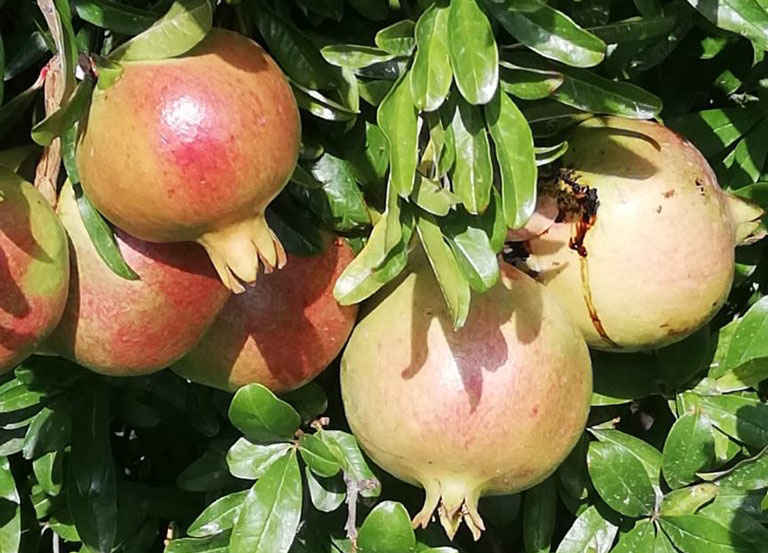
Farmers of Jabal Al Akhdar have begun harvesting pomegranate which is the main economic crop of the region. There are more than 27 thousand trees, and as an average, each tree produces 150 fruits.
The villages of Wadi Bani Habib, Saiq, A’Sharija, Al Oyeena, Al Aqr, Hail Al Yemen, Al Manakhir, Qatnah, A’Sograh and Al Qasha are some of the villages that are famous for growing pomegranates.
The percentage of viable fruits reached 96 per cent after the Ministry of Agriculture, Fisheries and Water Resources implemented the control programme and launched 155 million biocontrol agents (trichogramma evanescens) during 2020 season as part of the project of integrated management of the pomegranate butterfly in Jabal Al Akhdar, using alternative and modern control methods.
Since 2003, the Ministry has set up a programme in agricultural research centres to multiply the trichogramma evanescens, which are widely used in combating many insect pests.
Eng. Salem bin Rashid Al Tobi, Director of the Agricultural Development Department in Jabal Al Akhdar, told Oman News Agency (ONA), “This year’s season promises a good harvest, given the favourable and appropriate weather conditions and the amount of rain that fell, which led to the availability of a good amount of water to irrigate all the trees.
“The farmers have started marketing the fruits in the nearby markets. Next week, the 2020 season will be evaluated in terms of the number of fruits per tree and their average size.”
He added that in 2019, 215 million biocontrol agents were released at the mountain villages as part of the annual control programme, indicating that the average fruit per tree in the 2019 season was 101 fruit per tree, and the percentage of healthy, marketable fruits was 96 per cent.
Pomegranate farmers in Jabal Al Akhdar start caring for the pomegranate trees in mid-January by pruning trees, getting rid of dead branches, removing weeds, tilling the soil, adding compost and watering once every ten days. In May, irrigation continues between five to seven days until the end of September, when irrigation is permanently stopped for pomegranate trees from mid-November to the end of January to give the plant a rest period and to renew its activity in the following season.
Farmers in Jabal Al Akhdar go to Nizwa Market and some other nearby markets to sell their products, as the demand for Jabal Akhdar pomegranate has increased during the past seasons.
Its prices vary according to the season, the amount of production and the demand. Its prices are considered appropriate by the farmers in exchange for their effort, care and continuous follow-up from the beginning of January until its harvest, in addition to the fact that the crop is 100 percent organic and natural.
Because of the increase in tourism in Jabal Al Akhdar in recent years, the demand for the pomegranate crop has increased among tourists who visit Jabal Al Akhdar during the season.